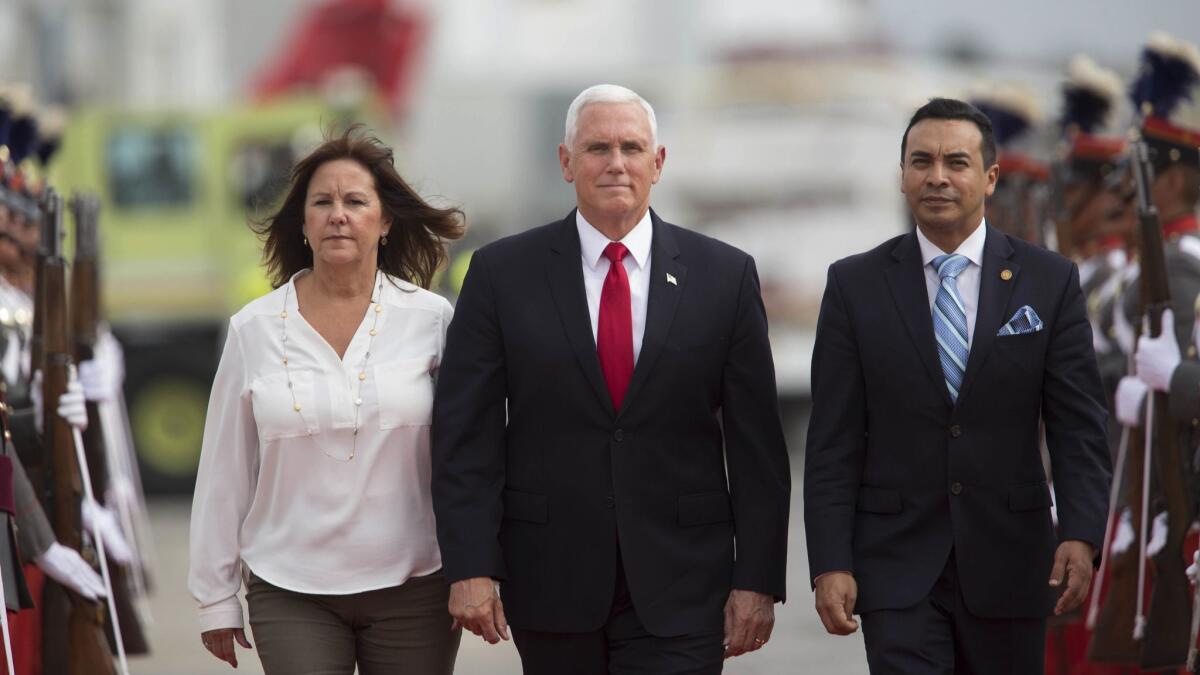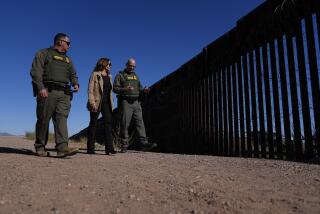Pence tells Central American leaders to do more to stem illegal immigration to the U.S.

Reporting from Guatemala City — Vice President Mike Pence demanded that Central American nations do more to stem illicit immigration, charging that few asylum seekers from the region had legitimate claims to safe haven in the United States.
“This exodus must end,” Pence told a meeting of leaders here Thursday from Guatemala, El Salvador and Honduras — which make up the so-called Northern Triangle that produces much of the illegal migration traffic to the U.S.-Mexico border.
“While many claim asylum, few are fleeing prosecution,” Pence said.
The comments came as the Trump administration has faced global condemnation for its now-discontinued “zero tolerance” policy, which resulted in the separation of more than 2,000 children from their families — mostly Central Americans. The U.S. vice president did not mention the family-separation issue.
President Trump reversed the policy last week, but numerous questions remain about how divided families will be reunited.
Pence focused on what he characterized as the shortcomings of Central American nations in failing to stem illegal immigration to the United States.
For years, U.S. authorities have rejected most Central American asylum applicants, deeming them economic migrants rather than refugees fleeing persecution because of various qualifying factors — such as race, religion, nationality or political opinion.
The Trump administration has reacted skeptically to the notion that people fleeing gang violence — which is endemic in the three nations — should qualify for asylum. That stance has angered human rights advocates here and in the United States.
“Just as we respect your borders and your sovereignty, we insist that you respect ours,” Pence said. “Our nation needs your nations to do more.”
He added, “Tell your people that coming to the United States illegally will only result in a hard journey and a harder life.”
The vice president called on the Central American countries to take a number of specific steps, including increasing the ranks of border police, enhancing anti-gang and anti-corruption efforts and removing “public advertisements for human traffickers within your nations” — the last an apparent reference to travel agencies, transport companies and other firms that publicly offer to facilitate trips to the U.S.-Mexico border.
“Don’t risk your lives or the lives of your children by coming to the United States on the road run by drug smugglers and human traffickers,” Pence said in a message to the Central American people. “Hold on to your homes and your homeland. Hold on to your children. Build your lives in your homes.”
There was no mention from Pence of past U.S. interventions in Central America or Washington’s past support for repressive Central American governments — a factor often cited by advocates seeking less restrictive U.S. immigration policy.
Central America, once a crucial Cold War battleground, has lately figured in U.S. policy mostly because it is a source of immigrants who enter the U.S. illegally and a transshipment point for cocaine destined for the United States.
Guatemala, Honduras and El Salvador are home to the bulk of Central American asylum seekers arriving at the U.S.-Mexico border.
Central American migrants, including many minors, have increasingly begun to outnumber Mexican nationals illegally crossing into the U.S. Most make a long and dangerous trek through Mexico to reach the border.
The vice president’s stop here continues a Latin American swing for Pence, who, while in Brazil, publicly discouraged Central Americans from making the journey through Mexico and to the U.S. border.
But critics say that is unlikely to stem the flow of people seeking to escape violence in their homelands.
“I think the president and the vice president should go read what’s on the Statue of Liberty again,” said Mike Donovan, president of Nexus Services, which has funded lawsuits and other efforts on behalf of children separated from their parents.
Immigration advocates argue that Pence should use his meeting with Central American leaders to focus on what they called a long-neglected issue: the root causes driving so many migrants to flee their home countries.
“The administration has been concentrating too long on how to stop people from entering rather than why they’re coming,” said Maureen Meyer, director for Mexico and migrant rights at the Washington Office on Latin America, an advocacy and research group.
Those factors include gang violence, drug-related slayings, political killings and abysmal economic conditions.
The Trump administration, however, is more likely to heed so-called immigration restrictionists, who want to reduce the number of immigrants in the U.S. and represent an important segment of the president’s base of supporters.
Under the Obama administration, Vice President Joe Biden spearheaded a nearly $1-billion program for Central America that helped finance police reform and development projects. But the Trump administration is seeking to slash aid to Central America by at least a third.
Trump has frequently complained that “Mexico is doing nothing” to help the U.S. immigration problem.
But migrants fleeing the Northern Triangle countries are often stopped in Mexico and sent home. Mexico has detained nearly 140,000 migrants from January 2017 to April of this year, according to the Mexican government. The vast majority were Central Americans.
The practice has been criticized by human rights activists who say many of the migrants are mistreated by Mexican immigration authorities and denied a proper opportunity to apply for asylum.
Julissa Reynoso, a former deputy assistant secretary of State for Central America and the Caribbean in the Obama administration, said that harsh penalties for crossing illegally into the United States cannot stop the flow.
“We have to do a much better job reinforcing institutions and opportunities” in the Northern Triangle countries, she said. “Unless we emphasize economic development ... migrants will continue to take the risk to come.”
,
McDonnell reported from Guatemala City and Wilkinson from Washington. Special correspondents Carolina Gamazo and Liliana Nieto del Rio in Guatemala City and Cecilia Sanchez in Mexico City contributed to this report.
Twitter: @PmcdonnellLAT
Twitter: @TracyKWilkinson
UPDATES:
8:50 p.m.: This article was updated with Pence’s statements about illegal immigration.
This article was originally published at 4:20 p.m.
More to Read
Sign up for Essential California
The most important California stories and recommendations in your inbox every morning.
You may occasionally receive promotional content from the Los Angeles Times.











